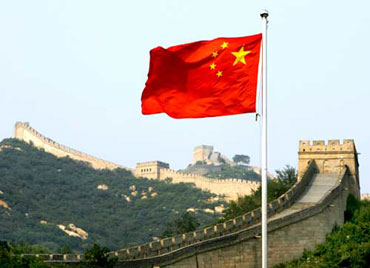
In a recent interview with rediff.com, Professor Arvind Panagariya had said that economic power would shift from the Western nations to Asia and China, and India would emerge as a major economic power.
Panagariya is a professor of Economics and Jagdish Bhagwati Professor of Indian Political Economy at the Columbia University in New York.
"In 15 years . . .we will more or less become what China is today and that will make us the fourth largest or maybe even third economy in the world," he had said.
Nobel Laureate Amartya Sen wrote in Asia Society: ". . . China is quite a big figure in Indian thinking and has always been so. In 7th century when Xuanzang left India and went back to China after having spent about a decade in India, he asked rather implausibly the question, 'Is there anyone in India who does not admire China fully?' This is the nice 7th century question. It is a serious question and of course it is coming in many different forms."
In the same article, Sen pointed out that "China's success in economic growth and the number of poorer people going down have been radically high. But let me mention here a slight contrast. The Chinese -- if the world has many fewer poorer people today in terms of lowness of income, and that is indeed the case, the biggest contribution of that has come from China. The second biggest is India but quite a big distance behind China."
Do you believe in this argument? Does India have what it takes to surpass China in terms of economic growth and prosperity, or at least catch up with the Dragon over the next few decades?
We asked common people to speak on the issue and came across some interesting viewpoints.
. . .

Dr Amitrajit Saha
Public health specialist, who has worked with marginalised populations.
I feel both India and China suffer from the same problems in terms of women's health, poor and malnourished children, lack of services and education.
Huge population is a vexing issue for both the countries. However, India has a democratic form of government but it is the so-called elite who have a considerable say in the government.
In China, on the other hand, the political situation is totally different, although it is heard that it is the elite that enjoy prominent position in the country's ruling party.
There is no denying the fact that China has brought about a paradigm shift as far as manufacturing is concerned. It has been able to grab the entire market of the West by virtue of its productivity.
Be it medicines, toys, chemicals, garments, computer accessories, electronic goods, China supplies all and in this aspect it has beaten India hollow.
Having said this, I must also say that freedom of Press has been thoroughly curbed in China and, therefore, no one really knows if the peasants, workers and poor population residing in the hinterland and hills are satisfied or are seething with discontent over their present economic state.
Coming back to India, I think the primary goal of India as a nation should not be to just achieve economic hegemony but also to attain a socio-economic supremacy. Our country is ruled by the United Progressive Alliance -- a coalition that could come up with National Rural Employment Guarantee Act.
Hence, I feel that in its mad chase to outdo China economically, India should not leave its social ambitions behind.
. . .

Sreyashi
Banker
India and China are not only neighbours, they are also two of the oldest civilisations in the world that take immense pride in their culture and heritage. And because of this, as also because of their large size and population, both consider themselves to be natural leaders of Asian nations.
This shared sense of superiority is suffused with an underlying rivalry which has become more pronounced in the recent times with the rise, or the perceived rise, of the two nations from being laggard, under-developed economies to economic superpowers of the future.
China has demonstrably been ahead, and is now the second most powerful economy, next only to the United States.
The question naturally arises: Can India top, or at least match, China's achievement? The answer for me, unfortunately, is no, at least not in the foreseeable future.
Let us compare the basic economic facts about the two countries:
| Facts | India | China |
| GDP | around $1.209 trillion | around $7.8 trillion |
| GDP growth | 6.7% | 9.1% |
| Per capita GDP | $1,016 | $6,100 |
| Inflation | 7.8 % | -1.2 % |
| Labour force | 523.5 million | 807.7 million |
| Unemployment | 6.8 % | 4.3 % |
On all the economic parameters, China is way ahead of India at this moment, and at the current rate of gross domestic product growth, it will take years and years for India to reach China's current level.
If we look deeper into the respective growth dynamics of the two countries, why China would stay ahead becomes apparent.
India's growth basically comes from the services sector, and within it, the IT sub-sector. Indian IT companies have done creditably, but IT growth alone cannot provide the necessary impetus to a country's overall economic growth.
For that to happen, you need growth happening in all the sectors, which is possible if a country invests in developing infrastructure -- social and economic.
India's agricultural growth is in decline, while the manufacturing sector is stagnating. India's railroad, power, roads, etc are in a shambles.
In contrast, China is investing its surplus in power, roads, and waterways management in a planned way.
India's investment in education and financial assistance to the weaker section is abysmal. It is an aphorism that a country of poor illiterates can never dream to become an world class economy, because those, and they are in a majority, who are left behind would pull back those, representing the Shining India, who wants to march ahead.
The level of inequality will have to come down, and that too drastically, if our country wish to have a realistic chance of competing with its powerful neighbour.
. . .

Prasanta Roy Choudhury
Economist
The question -- will India be able to surpass China economically -- hovers in the minds of many Indians.
But I feel such a comparison is biased and based on a disproportionate judgement. We would do well to see each economy in its own socio-cultural, demographic and administrative protocol or discipline.
In the eyes of an Indian, China, is a part of Asian Continent with two-and-a-half times more land under possession.
China has an autocratic governance under the guise of a benevolent socialism. The country witnesses the supremacy of state-capital-run enterprises.
Exploitation of the workforce, manipulative economic orders and supportive administration along with suppression collate to form a degenerative social chain and the China is able to produce a lot at a negligible cost. Which is why China earned over $2 trillion foreign direct investment in comparison to India's meagre $100-odd billion since liberalistaion.
In sharp contrast, India has a democratic style of governance. Hence the cost of production is high. It has an open economy and is producing and exporting software and software services to the world albeit at a higher price.
World order has established the qualitative base for its pharmaceutical goods. Indian economy is tested in the market and stable. The country is considered more developed when there is lesser dependents on primary sector.
As per available information, China has managed to move towards the secondary sector, while India is sustaining its position in the tertiary sectors.
Whether India will surpass China depends on its sustainability, durability and quality.
But on second thoughts, what matters the most is not if India can beat China but that Indians lead better lives in future.
. . .

Kamalendu Banerjee
owner of Kiran Engineering Works
Any country beats another by virtue of mere love and passion and nothing else.
A country grows economically only if it has a willingness to compete with other nations. I am sorry to say that India lacks in such attitude.
It's sad but true.
We have great minds, brilliant scientists. But have we been able to use that brilliance. No. There are only few industries in India, compared to China. A well formulated and pragmatic plan for growth is a nullity in India.
While China is creating a revolution in manufacturing, India is lagging way behind despite having all the potential to outdo China.
As a small businessman, I analyse the problem this way: while China aims to export its manufacturing goods and import as little as possible, we import every heavy industrial equipment and export only a few of our products.
It's high time the government of India came up with an elaborate growth and industrialisation map that would enable our country to at least keep pace with its biggest Asian competitor.
If we can't beat the Dragon, we can at least be at par with it.
. . .

Pranasish Saha
Electronics toy seller at Gariahat Market
I am extremely optimistic about India beating China's economy in recent future.It's only a matter of time till it happens.
A lot is said about China bringing about revolution in manufacturing. But if we take a closer look at the toys and other electronic goods manufactured by China, their prices are low but they hardly last.
Whereas toys and other electronic goods that are made in India are better crafted and last longer. The only hitch seems to be the price.
Chinese toy trains that I sell at my shop cost Rs 160 to Rs 200 whereas the same trains made in India are sold for Rs 380 to Rs 400.
I am an ordinary person and making tall economic talks doesn't become me.
Yet, I just cannot put forth the following questions to our honourable Finance Minister Pranab Mukherjee:
I firmly believe that India has enough potential to beat China but for a little motivation and effective economic measures.